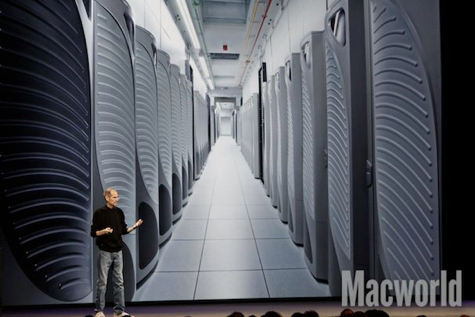What is Apple's huge data warehouse for?

Why is Steve Jobs standing in front a huge data warehouse just weeks after patching a big privacy hole in iOS?
Steve Jobs' morning keynote at Apple's World Wide Developers Conference included some shots of the new North Carolina data center - including this one:
These are Teradata data warehouse systems: massive, high-performance storage systems sold to enable:. . . the analytical performance you need . . . to intelligently process all types of analytical and business intelligence queries.
Translation: they aren't storing your music.
How massive? There are a couple of Teradata products that use this rack. The larger one, the Extreme Data Appliance is expandable to over 4,000 nodes and over 180,000 TB of capacity. In the picture it looks like there are at least 28 racks with a fully configured capacity of over 8,000 TB.
That's just one row of machines.
Geospatial services Another feature of the Teradata database:
Geospatial analysis: Built-in geospatial functions and analysis allow geospatial relationships (e.g., distance, within an area or territory) to be used with other business factors and all of the data in the data warehouse.
Very handy for the location aware services that iCloud provides. And valuable for retailers and manufacturers who want deep insight into their customer's buying habits and geographical spread.
The Storage Bits take There's more to the Apple data center story than we know today. Teradata is the industry standard for large data warehouses and they aren't cheap.
Seeing a large, commodity-based, cluster storage system would not have surprised me. After all, that's what Google and Amazon use.
But Apple - as usual - is charting a different course. The iCloud service may be free, but Apple is positioned to make good money from it by selling data on user behavior to others.
This doesn't mean you need to fear that your privacy will be compromised by iOS 5. But until we know how Apple anonymizes these massive data streams, the fear can - and should - remain.
Comments welcome, of course. $30 for the next version of Mac OS X? Redmond - start your copiers!
